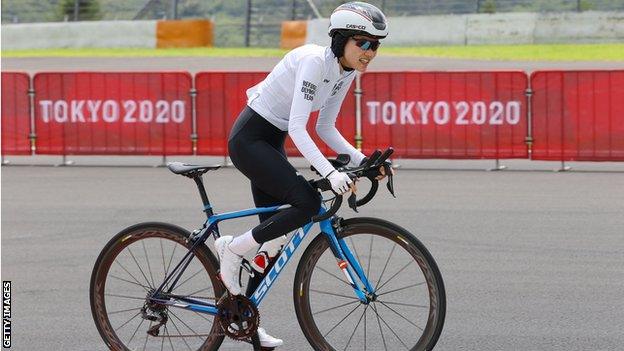Tokyo Olympics: Cyclist Masomah Ali Zada is a symbol of hope and inspiration
- Published

Masomah Ali Zada is one of 25 athletes representing the Refugee Olympic Team in Tokyo
For Afghan cyclist Masomah Ali Zada, competing at the Tokyo Olympics was not just a significant moment for her, it was a symbol of hope and defiance for the thousands of women across the globe who are not even allowed to ride a bike.
Masomah had stones and fruit thrown at her simply for taking to the road in her native Afghanistan, where targeted attacks on civilians by Taliban fighters, particularly prominent women, have been on the rise.
Eventually the situation became so dangerous Masomah and her family fled Afghanistan in 2016 and claimed asylum in France.
But that was not the end of her cycling story.
She won an Olympic scholarship for refugee athletes which helped fund her training and in May she was chosen to represent the Olympic Refugee Team in Tokyo.
On Wednesday she lined up alongside 24 other female riders at the Fuji International Speedway as an equal.
"It's a big responsibility as I represent 82 million refugees and all the women in Afghanistan and other countries where people think they should not ride a bike," she told BBC Sport.
"I take great pride in representing the refugee team and sending a message of hope and peace."
To make Masomah's story even more remarkable, Wednesday was the first time she had ever competed in a time trial event.
"It was my first time trial in my life because I prepared for the long distance, but at the last minute we decided to do the time trial," she added.
"It was an unforgettable experience for me."
Masomah ultimately crossed the line in last place as Annemiek van Vleuten of the Netherlands took gold, but simply being there represented so much more.

The life and legacy of one of the UK's greatest talents: Join us for a celebration of Amy Winehouse
Smalltown Boy: A powerful tale of a young gay man told through a disco classic
